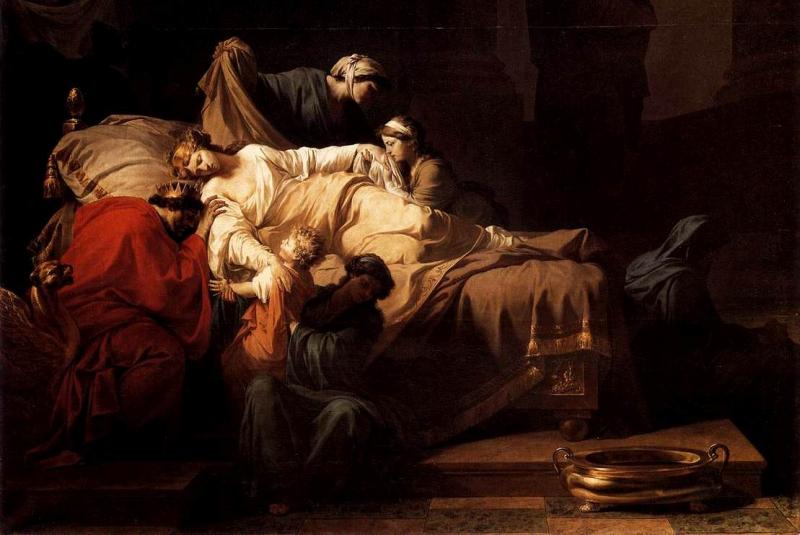Alceste, Early Opera Company, Curnyn, Wigmore Hall | reviews, news & interviews
Alceste, Early Opera Company, Curnyn, Wigmore Hall
Alceste, Early Opera Company, Curnyn, Wigmore Hall
Joy unalloyed in Handel's far from tragic incidental music for a classical drama

A wife dies to save her husband; a hero goes to hell and back to retrieve her from the underworld.
With his Early Opera Company, he's already recorded the Alceste music, adding a couple of numbers from two of the operas – one from Admeto, Handel's Italian setting of the Alceste legend, the other a Passacaglia from Radamisto to give a scene in the Elysian fields some body. Neither appeared last night, while both chorus and orchestra were reduced in size. No problem with any of that; the two-per-part chorus, including the soloists, was perfect, and to sit for the first time ever at the back of the upstairs gallery was to hear the gutsy, spirited sound pinging off the wooden panelling behind (note: this may be the best place to be in the entire Wigmore Hall). And the first half plums were so generous that there was no need of an artificially extended second-half divertissement.
Anything Boyce can do, Handel can do even better
In the Concerto grosso Op. 6 No. 1, ripieno soloists Catherine Martin and Oliver Webber gave a spirited lead to the small but meaty string ensemble – a very different sound to the airy elegance Curnyn is currently extracting from the ENO Orchestra in a peerless Partenope, though feminine endings were certainly not in short supply throughout the evening. Oboes gave a further sheen in unison with the strings for excerpts from Boyce's Solomon, a serenata whose simple pastoral "He"/"She" exchanges gave no hint of any reason for the title.
No matter; there were surprises here. First came the inflections word-sensitive tenor Benjamin Hulett, singing of "He"'s "fair and comely" love, brought to Boyce's surprise setting of "the accents wound". Then there were the two trumpets – gleaming, note-perfect David Hendry and David Carstairs – bringing a special radiance to the fizzing soprano aria, and the dark colours of the "southern breeze" in the last number before the choral entry.
 Anything Boyce can do, though, Handel can do even better. His ceremonial "Grande Entrée" for Admetus and Alceste, also trumpet-bright, has extraordinary downward and upward rushing scales. Of the choruses, the opening figure of the repeated "Thrice happy" is both memorable and interestingly distributed among the parts. Hulett showed flawless brilliance in fast runs, matched for character by James Platt's one appearance as feisty Charon. Mary Bevan (pictured right by Tina Haldane) charmed in the kind of Morpheus number which by 1749 Handel could do, if you'll forgive the phrase under the circumstances, in his sleep: it's pretty, but lacks the depth a really great aria can give to a single act of a Handel opera.
Anything Boyce can do, though, Handel can do even better. His ceremonial "Grande Entrée" for Admetus and Alceste, also trumpet-bright, has extraordinary downward and upward rushing scales. Of the choruses, the opening figure of the repeated "Thrice happy" is both memorable and interestingly distributed among the parts. Hulett showed flawless brilliance in fast runs, matched for character by James Platt's one appearance as feisty Charon. Mary Bevan (pictured right by Tina Haldane) charmed in the kind of Morpheus number which by 1749 Handel could do, if you'll forgive the phrase under the circumstances, in his sleep: it's pretty, but lacks the depth a really great aria can give to a single act of a Handel opera.
Yet this, after all, was only a pair of ceremonials for the outer acts of the projected grand drama. One soprano more might have brought greater range; the younger of the talented Bevan sisters is impeccable in her musicianship, but a tad more cut would have brought off a duel with Handel's staggering writing for strings in "Come, Fancy" more effectively. That takes a diva of the first order like Lucy Crowe on the Chandos recording. Still, the pleasure flowed uninterrupted: just the tonic, in the form of numbers in English by a German-born composer on a Greek subject, at the end of a dark day.
- Next Early Opera Company concert, of Pergolesi's Stabat Mater, at St John's Smith Square on 12 May
- Read more classical music reviews on theartsdesk
rating
Share this article
The future of Arts Journalism
You can stop theartsdesk.com closing!
We urgently need financing to survive. Our fundraising drive has thus far raised £49,000 but we need to reach £100,000 or we will be forced to close. Please contribute here: https://gofund.me/c3f6033d
And if you can forward this information to anyone who might assist, we’d be grateful.

Subscribe to theartsdesk.com
Thank you for continuing to read our work on theartsdesk.com. For unlimited access to every article in its entirety, including our archive of more than 15,000 pieces, we're asking for £5 per month or £40 per year. We feel it's a very good deal, and hope you do too.
To take a subscription now simply click here.
And if you're looking for that extra gift for a friend or family member, why not treat them to a theartsdesk.com gift subscription?

Add comment